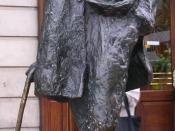Throughout this semester, I have come upon the most famous and respected British writers. Each, a master of their time, represent the age during which they wrote. In my mind, James Joyce is a standout among standouts. This is a hard thing to accomplish when you are in the company of T.S. Elliot, William Yeats, and Dylan Thomas. It could be my preference of style of writing that make Joyce my "pick of the litter"ÃÂ. Joyce has a "straight ahead"ÃÂ way of writing some of his works. Yet, they also make you think and don't give you all the answers. A story I thoroughly enjoyed by James Joyce was "Araby"ÃÂ.
There are many reasons why I like Joyce's "Araby"ÃÂ. First, it is rather short compared other writers' works. I know this isn't the best reason for liking a writer. But, for some people "short and sweet"ÃÂ is something that interests them more than long, drawn out and complicated.
Also, because "Araby"ÃÂ is short, doesn't mean that it isn't complicated or complex. It means that Joyce can present a feeling or thought in less script. Within a short story, Joyce can present a feeling to the reader that might take another writer twice the writing. I think this because of what I personally got out of "Araby"ÃÂ. Joyce is definitely a master with vocabulary. He knows how to state everything perfectly. For example, when Joyce describes the boy's attraction to the girl, I can't do anything except think about attractions I had for people in the past. "Her name sprang to my lips at moments in strange prayers and praises which I myself did not understand. My eyes were often full of tears (I could not tell why) and at times a flood from my heart seemed to pour itself out into my bosom."ÃÂ It is not only his vocabulary, it is how he writes about things people can relate to. Joyce's stories are not "out of this world"ÃÂ, they are "close to home"ÃÂ.
There are many situations presented in "Araby"ÃÂ that can by analyzed for different meanings. The big situation to analyze in "Araby"ÃÂ is obviously the ending. What does it mean? To different people, it means different things. To me, "Araby"ÃÂ is a lesson. In this situation, you have a boy that is infatuated with a certain girl. The boy promises the girl, who he really adores, that he will get her something from the bazaar. In his mind, he will do ANYTHING in the world for this girl. But, when it comes down to actually doing the deed, he can't carry out the favor. I think that there may also be another lesson the boy learned in the end. Judging by the words Joyce uses, I think the boy feels "used and abused"ÃÂ by the girl. The powerful words Joyce used, that makes me think the boy was "used and abused"ÃÂ, are creature, driven, derided, vanity, anguish, and anger. These words all have extremely negative meanings to them. First of all, the boy refers to himself as a creature. Creatures are always outcasts that have a main thought process to kill and/or be killed by society. Also, Creatures are always hunted. Vanity is also negative because it means; excessive pride in one's appearance, qualities, gifts, and appearances. In this case, the boy definitely had excessive pride in what he though he could do. But, once again, when it came down to it, he could not carry out the deed.
A SMALL lesson that may be told in this story is a story about money. Money may be presented in this story as the "root of all evil"ÃÂ. Perhaps, if she asked for something that had no money value, the story would have ended in a totally different way.
I also found something interesting about "Araby"ÃÂ. The girl that the boy is interested in is presented, more than once, with light being cast upon her. I think this may have been done to give her a god-like quality. If not god-like, a quality of something that is untouchable.
I thoroughly enjoyed reading stories by James Joyce, especially "Araby"ÃÂ. To this day, I keep trying to grasp onto what the ending might actually mean. This is what I think is so great about Joyce. He presented just enough information to make the reader analyze "Araby"ÃÂ to the extreme. I am sure this is what he intended.



